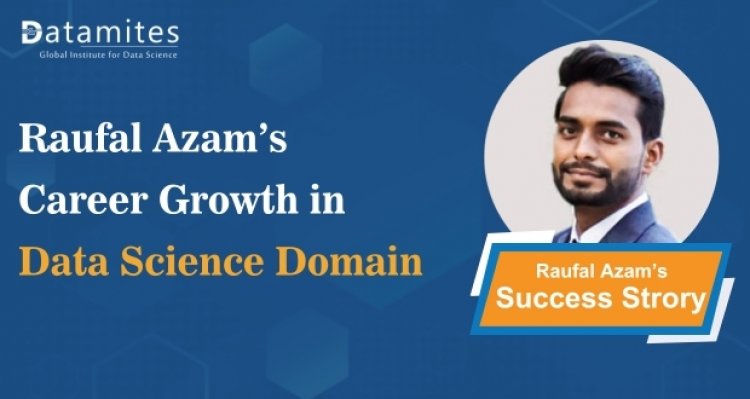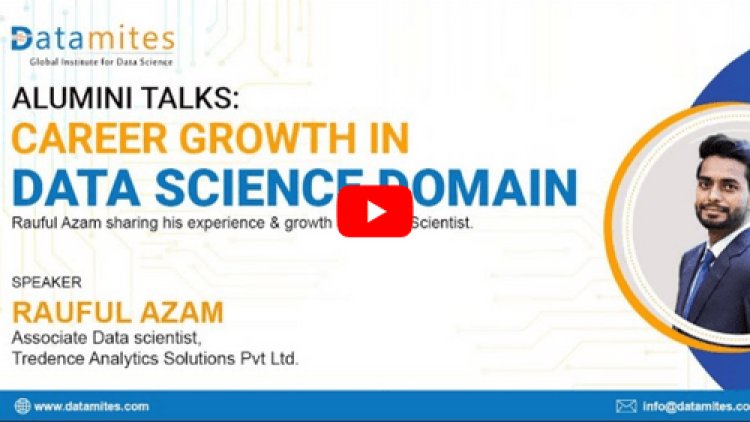Career Growth in Data Science Domain – Raufal Azam
Explore the key strategies and insights for advancing your career in the data science field. Learn how to navigate opportunities, skills, and trends to boost professional growth.

Data science stands out as a field brimming with opportunities and challenges. Aspirants often find themselves grappling with questions like, “What background do I need to have?”, “Which programming languages should I learn?”, and “How can I transition into a data science job role from a different field?”. These questions are pivotal for those standing at the crossroads, looking to dive into the world of data, analytics, and insights.
In this article, we have the pleasure of uncovering the answers to these queries and more through the lens of Raufal Azam’s journey in data science. Raufal, an alumnus of DataMites, has navigated the ups and downs of the data science domain, carving out a successful data science career path for himself. Currently thriving in his role as an Associate Data Scientist at Tredence Analytics Solutions, Raufal is a prime example of how a solid foundation in data science, paired with relentless drive, can lead to success.
Q1: Raufal, could you please start by telling us about your educational background and how it led you to the field of Data Science?
I have a background in Computer Science, where I learned the fundamentals of programming and algorithms. Initially, I was more inclined towards software development, but as I delved deeper into the subject, I discovered the vast and intriguing world of data. Interestingly, my passion for entrepreneurship led me to realize that Data Science could enhance my business skills, making it a crucial part of my success strategy.
Q2: That’s an interesting transition! Once you decided to move into Data Science, what were the initial challenges you faced, and how did you overcome them?
Transitioning into data science was quite challenging. I had to get used to the stats and math involved, as my background was more in tech. I also needed to learn how data-driven decisions affect a company. To deal with this, I asked experienced data scientists for advice and worked on real data problems. Realizing I needed structured learning, I took DataMites‘ Data Science Training. This was a game-changer, helping me understand both the tech and business sides of data science better.
Refer these below articles:
- How to Become a Data Scientist in Bangalore?
- How to Become a Data Scientist in Pune?
- How to Become a Data Scientist in Chennai?
Q3: What led you to choose DataMites for your Data Science training?
When my interest in data science piqued, I immediately began searching for reputable data science training institutes, which is how I stumbled upon DataMites. The positive student reviews really stood out to me, ultimately swaying my decision. Despite the challenges posed by the pandemic, I enrolled in their 6-month online data science course. Eager to kickstart my career, I started job hunting from day one of the course and, to my delight, secured a data science job in two months later. I dedicated my full attention to prepping and completing projects, which played a significant role in my swift job placement.
Q4: How did DataMites help you in transitioning to data science and building a strong foundation?
DataMites played a crucial role in my transition. The data science courses here are well-structured, covering the basics to advanced topics in data science. The mentors are knowledgeable and were always available to guide me through my learning journey. The hands-on projects helped me apply the theoretical knowledge in practical scenarios, which was invaluable.
Read these below articles:
- Suvesh’s Career Growth in Data Science Domain
- Journey from Mechanical Engineering to Data Analyst
- Journey from Architect to Machine Learning Engineer
Q5: What is the most crucial skill or quality that one must possess to succeed in the field of data science?
The most important thing in Data Science is being good at solving problems. You need to look at tricky situations and figure out how to make sense of them using data. It also helps a lot to know the basics well, like linear regression and logistic regression, and understand the math that makes them work. These are like the building blocks that help you make sense of data and solve real-world issues.
Q6: What platforms do you use for data science projects?
For our data science projects, we use a set of advanced tools to work efficiently and accurately. Our main tool is TensorFlow, which helps us create and use machine learning models, even for complicated tasks. We also use MongoDB to store our data because it can handle large amounts of information and is easy to use. This combination of tools ensures that we can tackle a wide variety of data science challenges effectively.
Q7: Is data science a suitable field for individuals who may not have strong skills in programming or mathematics?
I truly believe that at the core of excelling in data science, or any field for that matter, lies a deep-seated passion and enthusiasm. When you have a genuine interest and motivation to delve into the world of data science, it propels you forward, fueling your desire to learn, explore, and master both the basic and complex aspects of the domain.
Q8: What steps should one take to get started in data science?
To start in data science, you should first learn Python (a programming language), machine learning, deep learning, a bit about how to work with text data (NLP or Natural Language Processing), and some basics of how to use databases (SQL). However, when you look at what jobs are asking for, they often want more skills, like knowing how to use cloud services such as AWS. So, it’s a good idea to watch videos on YouTube to learn these extra data science skills. Knowing these things can really make your job application stand out and increase your chances of getting noticed and called for an interview.
Q9: Could you share your experience with online data science training and its role in your career development?
Online data science training played a significant role in my career development. It provided me with the flexibility to learn at my own pace and access resources from leading institutions and professionals in the field. The practical assignments and projects that were part of the training helped in consolidating my learning and building hands-on experience. Additionally, the community and forums associated with online training platforms provided a space to connect with peers and industry professionals, which was invaluable for networking and learning.
Q8: How do you perceive the future of Data Science, and what opportunities do you think it holds?
The future of Data Science is incredibly bright, and it continues to be one of the most sought-after careers. With the increasing reliance on data-driven decision-making, the demand for skilled data scientists is only going to grow. Opportunities are abundant across various industries such as healthcare, finance, retail, and technology. Furthermore, with advancements in technologies like AI and machine learning, the scope of Data Science is expanding, opening doors to more innovative and challenging roles.
Q9: Any advice for aspirants looking to build a career in data science?
Stay curious and never stop learning. Don’t be afraid to take on new challenges, and make sure you have a solid foundation in both the technical and business aspects of data science. And most importantly, enjoy the journey!
Q10: Finally, Raufal, how has your journey been from a Data Science aspirant to a successful professional in the field?
The journey has been challenging but immensely rewarding. There were moments of doubt and hurdles along the way, but the key was to stay persistent and keep learning. Every project, every challenge was an opportunity to grow and hone my skills. The satisfaction of solving complex data problems and making an impact through my work has been the biggest reward. I believe that my willingness to learn, my curiosity, and my ability to communicate effectively have been the pillars of my success in this field.
Raufal Azam’s journey in the Data Science domain is a testament to the power of persistence, continuous learning, and the willingness to take on challenges. His story highlights the importance of a strong foundational knowledge, practical experience, and the ability to communicate complex ideas effectively.
Watch the complete interview here
If you’re eager to embark on your own data science journey, consider exploring the offerings of DataMites. We provide comprehensive online data science training and also offer data science offline training in Bangalore and we also offer offline training sessions in major cities like Pune, Hyderabad, Mumbai, Nagpur, Delhi, Chennai and Ahmedabad. Many of these courses include IABAC certification, which can significantly enhance your professional credentials in the field. So, whether you’re starting from scratch or looking to advance your data science career, there are ample opportunities and resources available to help you succeed.
DataMites Institute is a globally renowned institution offering in-depth Data Science training that covers AI, Machine Learning, Deep Learning, Python, and Data Analytics. With an emphasis on industry relevance, the program provides IABAC-accredited certification for global recognition. Students gain practical experience through hands-on learning, internships, and job support, ensuring they are well-prepared to thrive in the data-driven world. Whether you're beginning your career or looking to enhance your skills, DataMites empowers you with the expertise needed to succeed in Data Science.

